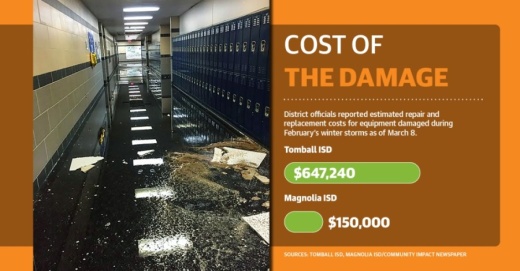According to state officials, temperatures dropped inside homes and businesses due to the power outages, indirectly causing water in pipes to freeze and expand. Once electricity was restored and temperatures rose, the once-frozen pipes thawed, leading to water damage.
Tomball and Magnolia ISDs reported $647,240 and $150,000 estimated in damages, respectively.
“I’ve been in Tomball for 18 years; I’ve seen the physical impact of tornadoes, four hurricanes, two major flooding events, a wildfire to the north of the district ... and two major arctic ice storms,” TISD Chief Financial Officer Jim Ross said March 8. “I’ll tell you, as far as all of them combined, nothing’s been as bad as this.”
Among the residents and businesses affected by the storm’s turbulence was the Magnolia Exotic Bird Sanctuary, which provides refuge for 150 exotic birds, Communications Director Candace Tanner said.
Despite moving some birds inside, setting up heat lamps, and blanketing the aviaries, Tanner said the sanctuary lost two birds—in addition to dealing with a lack of water and busted pipes. The center is now raising funds to build a larger building, obtain generators and install an on-site well to be self-sufficient.
“We really thought that we did everything we could possibly do to protect them,” Tanner said. “Part of our mission statement is to protect and prevent the suffering of captive parrots. And when this storm came and there was no electricity and no water, we didn’t protect them.”
Although a portion of the Magnolia area is serviced by a separate grid, the isolated energy grid that services most of the state was cited by critics as a contributor to the devastating outages that have since led to a political reckoning.
Maintaining the grid
The Tomball and Magnolia area is serviced by three electricity providers: CenterPoint Energy, the San Bernard Electric Cooperative and Entergy Texas. CenterPoint and San Bernard are in the state’s grid and coordinated by the Energy Reliability Council of Texas. Entergy Texas, which serves most of Montgomery County, is part of the Eastern Interconnection, and its reliability coordinator is the Midcontinent Independent System Operator, which delivers power to 15 U.S. states.On Feb. 14, every county in Texas was under a winter storm warning, according to the National Weather Service.
ERCOT alerted generators and distribution partners that the storm would bring “record-breaking demand” to the system, but some lawmakers pointed out the decisions that set up the grid for potential failure were made years in advance, such as failing to protect facilities from harsh cold conditions.
Entergy winterized its power plants and transmission grid prior to and during the storm, including the addition of wind breaks, heaters and insulation, said Allison Payne, senior communications specialist of Entergy Texas. Still, the company will be conducting a post-event review of the steps it took and what could have been done better.
“[We will be] investing in improving our system not just for reliability but [also] further investment in grid resiliency,” Payne said.
Despite this preparation, nearly 60,000 Montgomery County customers of Entergy Texas were out of power Feb. 15, according to Entergy’s outage map. Comparatively, across the CenterPoint service area, 1.42 million customers were in the dark by 8 p.m. Feb. 15, according to data from the transmission provider. Billy Marricle, president and general manager of San Bernard, which provides energy to a portion of Montgomery County southeast to Lavaca County, said his members saw rolling outages of about an hour at a time.
“I think we were prepared. We go through an [Energy Emergency Alert] simulation once a quarter,” Marricle said. “We had already picked out the locations that we would not shed any [circuits].”
Officials statewide are calling for a reform and investigation into ERCOT and the Public Utility Commission of Texas, the state agency that regulates electric, water and telecommunication utilities. Yet there is no apparent investigation underway into MISO, Entergy or San Bernard from state or local elected officials.
“There’s no excuses for [the failures],” Montgomery County Judge Mark Keough said of Entergy. “[But] they worked as hard as they could in the time that they had.”
Storm aftermath
In the immediate aftermath of the storm, Gov. Greg Abbott made ERCOT reform an emergency item during the 2021 Texas legislative session.The Legislature began hearings Feb. 25 with ERCOT, the PUC and other energy providers.
Freezing weather has only led to two other incidents in ERCOT’s history: once in December 1989 and again in February 2011. Following ERCOT’s challenges in 2011, the House Committee on State Affairs penned a report outlining the committee’s “serious concerns with the regulatory initiatives taken by” the PUC and ERCOT.
But while ERCOT has come under fire—CEO Bill Magness was fired, its board of directors resigned, and Texas House and Senate hearings were held to investigate the grid failure—it is not clear if any action will be taken against MISO.
When asked, state Rep. Will Metcalf, R-Conroe, did not say if similar scrutiny would be applied to Entergy or MISO but said there will be future discussions.
“ERCOT is 90% of the state of Texas, so that’s why they’re the first in our committee hearings,” he said. “We will definitely be continuing [conversations with Entergy and MISO].”
Local effects
Beyond power outages, many residents found themselves without water for several days.Tomball and Magnolia city officials said prior to the mid-February storm, the cities had never lost their water systems.
“As far as we know the system has functioned properly since it was built,” Magnolia City Administrator Don Doering said. “The problem is when you get down to 7 degrees temperature for more than a couple hours, a lot of our pumps and pump motors are outside—they’re not housed in the building.”
Both cities issued boil water notices following a lack of water pressure from systems freezing up.
“The initial reports on the weather was that this storm was going to be heavily an ice-accumulation storm. ... We geared up a lot for the ice accumulation, which it turned out we didn’t get any of that,” Tomball acting City Manager David Esquivel said. “I don’t know if in hindsight we could have done much else that we did. ... Our stuff is not built for this.”
Following the storm, Magnolia City Council members approved a proposal to use mass-notification system Blackboard Connect for future emergency outreach March 10 instead of its current Nixle program. Police Chief Kyle Montgomery was also appointed emergency coordinator.
With providers outside of the city also without water, MISD could not open its Magnolia Event Center as a warming center, Superintendent Todd Stephens said March 8. As such, the district is exploring adding a water well at the event center so the facility can be self-sufficient.
“One of the things that we did with this center was add a generator to it so we could open it as a shelter. The next step would be to put a well because if you don’t have water, it kind of makes it difficult to do one of the purposes that we built this for—to serve the community,” trustee Travis Moffatt said.
Hunter Marrow, Adriana Rezal and Ben Thompson contributed to this report.








